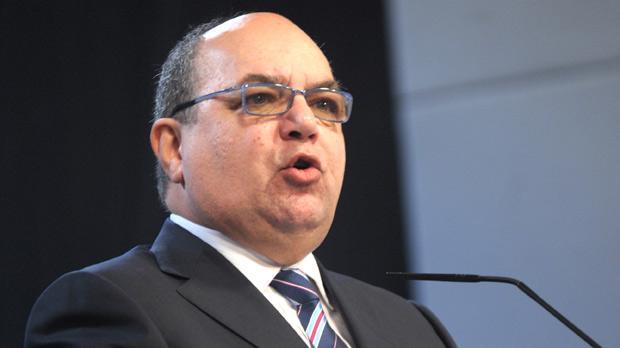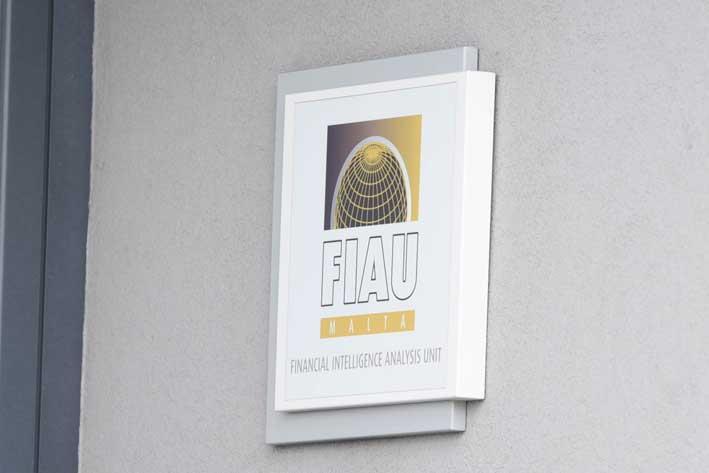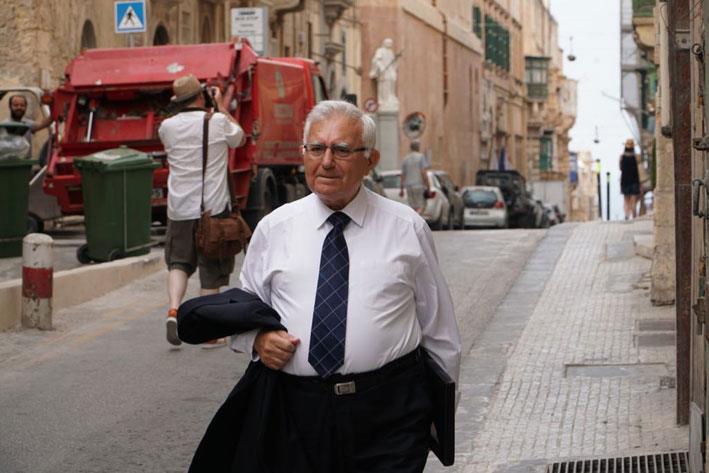Former police chief John Rizzo said that he would have started an investigation into the Panama Papers and into reports compiled by the FIAU “straight away”, had he been in the post of police chief.
Rizzo was testifying in the public inquiry into the murder of Daphne Caruana Galizia.
Rizzo was removed from the post of police commissioner four weeks after Labour came into power, and although he was later offered a post in the Security Services, he was later transferred to the Civil Protection Department. The police have had other four commissioners since.
The corps has been harshly criticised for the way it failed to tackle the Panama Papers scandal as well as for not investigating reports compiled by the FIAU.
Rizzo said that his transfer was "questionable" and notes that two days prior he had been called by the Prime Minister where they had discussed that he would have a place in the Security Services and that he would have time to tell this to his family. He said that he was meant to meet the Prime Minister the next day, but instead met Keith Schembri who told him that he was needed at the Civil Protection Department, where he spent four years "got fed up" and then left. Asked by Madam Justice Lofaro whether he had been given an explanation for why the Security Services post had fallen through, Rizzo replies unequivocally: "Never".
Previous sittings before the inquiry, led by retired judge Michael Mallia, saw the testimony of the closest relatives to the journalist, who was killed in a car bomb on 16 October 2017. These included her parents, husband, sons and sisters.
Apart from Judge Mallia, the other two members of the inquiry board are former chief Justice Joseph Said Pullicino and Madam Justice Abigail Lofaro.
Jason Azzopardi and Therese Comodini Cachia are representing the Caruana Galizia family.
The public inquiry resumes on Thursday at 2.20pm.
Before Rizzo's testimony, Speaker Anglu Farrugia had also testified. His testimony may be found here
Rizzo's testimony minute by minute below
4.09pm: He said that he had received a call from Prime Minister Muscat right after the election asking whether everything was okay in Bidnija, and he clarified that this was for the protection detail to Daphne Caruana Galizia. Judge Mallia points out that this was before Muscat had taken oath as Prime Minister. Rizzo states that Muscat had not even left the counting hall at the point that he made this call. The board observes that Caruana Galizia's security was already a concern immediately after the election. That concludes Rizzo's testimony.

4.07pm: Rizzo states that he had informed the new Home Affairs Minister Manuel Mallia about the fact that there was enough evidence to take John Dalli to court. He notes that MaltaToday had published a story that Dalli had been told to lie, something which he had categorically denied. Manuel Mallia was present at the time as he was opening a Good Friday Exhibition, and on that day he made it clear to Mallia that they had enough evidence to take Dalli to court. That was a day before he was informed that Dalli was going to be returining to Malta, but eventually returned after Rizzo had been transferred. Three days later, he had received a phone call from Castille for a meeting, which ended with Muscat telling him "I'll speak to you soon, John", which is where things kicked off from.
4.01pm: He said that after the 2013 election, he was certain that there was still protection for Daphne Caruana Galizia. He does not remember however whether he had ordered an end to that protection before being transferred, but noted that there would be records of this at the Police. Rizzo said that there were a lot of changes even in the few weeks he remained in the role of Police Commissioner after the election.
3.59pm: Therese Commodini Cachia asks for clarifications on the circumstances surrounding Rizzo's transfer. Rizzo states that from his meeting with Joseph Muscat he has received a number of offers and he says that he was allowed to choose wherever he wanted as long as it wasn't as Police Commissioner. He said that he had preferred a post at the Security Service, but that the day after Keith Schembri had told him he was needed at the CPD. He notes that he was also offered a 10,000 euro consultancy over and above all this, which he had refused out of principle.
3.55pm: Asked whether he would be directly involed in cases, Rizzo says that he would be but when he wouldnt he would receive daily briefings from the investigator in charge. Asked whether he would go to the site of a murder, Rizzo replies that he felt that he was duty bound to do so. That concludes the questions from the board.

3.53pm: Lofaro asks what he would do with FIAU reports. "Pass them on for investigation", Rizzo replies; "Straight away?", Lofaro asks; "Of course, what else would I do?", is the reply. Lofaro asks whether he would launch an investigation even based on an allegation, to which Rizzo replies in the affirmative and says that most investigations start from allegations.
3.50pm: Madam Justice Lofaro asks whether Rizzo would launch investigations on situations which Caruana Galizia would write about on her blog. Rizzo replies in the affirmative, recalling a particular case in relation to Jeffrey Pullicino Orlando as an example. Rizzo states that the police has an obligation to investigate anything that comes from a report, from a complaint, or from an anonymous tip. He recalls his investigation into the oil scandal as an example. Madam Justice Lofaro cites the Panama Papers, asking hypothetically whether he would have investigated the matter had it come to him, to which Rizzo replies in the affirmative.
3.46pm: Rizzo said that his transfer to the Civil Protection Department was "questionable" and notes that two days prior he had been called by the Prime Minister where they had discussed that he would have a place in the Security Services and that he would have time to tell this to his family. He said that he was meant to meet the Prime Minister the next day, but instead met Keith Schembri who told him that he was needed at the Civil Protection Department, where he spent four years, "got fed up" and then left. Asked by Madam Justice Lofaro whether he had been given an explanation for why the Security Services post had fallen through, Rizzo replies unequivocally: "Never".
3.44pm: There were several important investigations pending at the time of Rizzo’s removal from his post. "I would only involve myself in investigations of a certain importance," he said. “There was the oil scandal... I had arraigned five or six people. There were no other important investigations in which people had not been charged, at the time."

3.39pm: “We could not pursue the case because (John Dalli) was in Brussels. We were waiting for him to return to Malta", Rizzo said before recalling that Dalli eventually only returned to Malta after Rizzo had been replaced. Rizzo adds that as soon as he left his post, two days later, incoming police commissioner Peter Paul Zammit had said there was no more evidence in the Dalli case.
3.36pm: The discussion turns to John Dalli. Rizzo states that the Maltese police had started an investigation from scratch, and he states that he genuinely believes that they had enough evidence against Dalli to go to court. The Deputy Commissioner was involved in the investigations, as was an investigator who is now CEO of the Police - all were of the same understanding, he said. However, his successor Peter Paul Zammit had made a declaration that there was not enough evidence to continue; "he can answer for that himself", he said. Dalli had resigned from his European post after an OLAF investigation implicated his office in an alleged case of bribery.
3.34pm: He notes that he had never brought the Security Services into investigations, and said that he had only used them for intercepting phone messages and signals. Judge Said Pullicino notes that therefore given the testimony, Rizzo is saying that in his time there was never any intervention in his work. Rizzo replies that he had "complete liberty" in his role.
3.32pm: Asked whether there was any intervention by the ministry or communication, Rizzo said that it is normal for discussions to take place but notes that there had never been any butting in on the part of the ministry. Mallia asks whether there was any exchange of information between the police and security services. Rizzo replies that when he used to investigate matters, he used to speak to the Commissioner who would in turn make a request for phone interceptions from the security service. He notes that during his time, the Prime Minister or any Minister would not be present for security briefings - these would be between the Police and the Security Services.
3.27pm: Asked whether in the weeks following the 2013 election while he was still in his role he had provided protection to Caruana Galizia, Rizzo said that there was protection during the election in 2013. "I am 100% on that", he said. He however states that he does not know when it had ended. He said that there was never any pressure or specific order for the protection to stop after the 2013 election. Rizzo said that he stayed on as commissioner four weeks after the election.
3.24pm: Judge Mallia asks about Rizzo's assertion that there was already some form of protection, to which Rizzo replies that this was on and off and that he had followed in this vein. He said that the government had never intervened in providing protection. He said that he was certain that in 2013, before he had left the role, Daphne Caruana Galizia still had protection. Rizzo said that there were times where he felt that it was his obligation to provide protection to the family. He recalled an incident where the house back door had been set on fire, a moment where he too had gone on the site as an example.
3.22pm: Rizzo states that the protection was not only during his tenure; his predecessors had also provided such protection when they felt the need. Rizzo said that there were period where a fixed point would be placed near the Caruana Galizia residence, other times were very frequent patrols were done - one must see the times and evaluate the risks to take decisions which the police felt were necessary. He says that he doesn't think that Daphne Caruana Galizia ever asked for the protection, and notes that there were times when it had probably bothered her as well. He said that its difficult though to give a specific time frame one each type of protection.
3.20pm: Judge Mallia starts off things by asking Rizzo when he was police commissioner, to which Rizzo replies that he was Commissioner between November 2001 and April 2013. Mallia says that during his time, there was an element of protection for Daphne Caruana Galizia. He asks Rizzo for details of this protection.